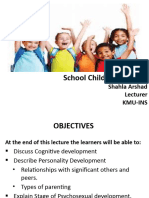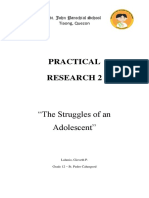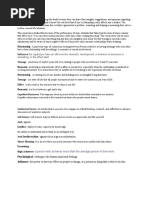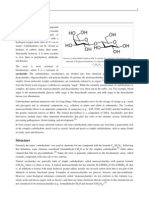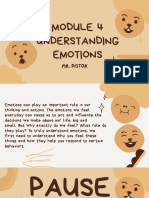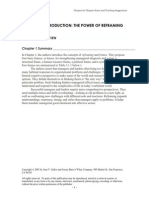Case Study
Case Study
Uploaded by
John Mark Alvin TorresCopyright:
Available Formats
Case Study
Case Study
Uploaded by
John Mark Alvin TorresCopyright
Available Formats
Share this document
Did you find this document useful?
Is this content inappropriate?
Copyright:
Available Formats
Case Study
Case Study
Uploaded by
John Mark Alvin TorresCopyright:
Available Formats
A Psychological Assessment of Jenny Roxas Talves
In partial fulfillment Of the requirements in PSY 109 Psychological Testing
Submitted By: Favor, Noel DB SY0534
Submitted To: Mr. Mardy E. Dizon On October 14, 2011
I.
Personal Data Name: Jenny Laine Roxas Talves Gender: Female Civil Status: Single Age: 18 Birthplace: Hong Kong Place of residence: Taytay, Rizal Parents name and occupation: Mother: Liwanag R. Talves Occupation: Self-employed Father: Cyril L. Talves Occupation: Seaman No of Siblings: None Educational Background: Elementary: Our Lady of Peace School (located at; P. Oliveros, Brgy. San Jose, Antipolo City ) High School: Our Lady of Peace School (located at; P. Oliveros, Brgy. San Jose, Antipolo City )
College: Far Eastern University Manila (located at; Nicanor Reyes Street, Sampaloc, Manila) II. Personal History The subject was born on January 5, 1993 at Hongkong. The subject did not indicate any signs of conflict until she reached grade 4. The subject stated that she experienced family separation when she was on that age. After the incident, the subject stayed with her mother, thus resulting to the subjects emotional detachment with her father. The subject indicated that whenever she was with her father she really had a hard time being with him. Also this experience led to the subjects fear of rejection and being left alone. She loves to be inside a group or a circle of friends because in a way it compensates her feelings of anxiety with regards to her experiences in her family. The subject was the only child in the family, in a way affecting her personality in terms of socializing with others. She loves to be with her cousins, to meet people in line with her age and even older than her. When the subject reached the academic age, she did not indicate any sign of her being bullied by others. In terms of relationships to opposite sex, she stated that she was scared on taking any risks due to her past experiences in terms of this matter. But now she said she can now manage it. In terms of her interpersonal life, the subject was really sociable and fun to be with. So there were no signs of conflict indicated on this matter. Lastly, the subject likes to eat especially exotic foods, play badminton, and hang out with other people.
III.
Reason for Referral The subject was referred to me by a friend who was also a Psychology
student. She trusted me to take the opportunity of assessing her best friends behavior because she might bias the results of the test if she will be the one to interpret the findings. IV. Behavioral Observations As for the subjects behaviour, she was really sociable. It was really observable because the test examiner himself did not indicate any signs of shyness or timidity on the subject on their first meeting. The test examiner did not had a hard time to establish rapport with the subject. In terms of answering the test, the test examiner observed that the subject really had too much difficulty and lacks patience in answering a large number of tests especially on tests with a large number of items like the EPPS. The subject also took the exam seriously so there will be no problem in terms of the accuracy of the results of the test.
V.
Test Administered Date of Administration October 7, 2011 October 7, 2011 October 7, 2011 October 7, 2011
Psychological Tests 1. Intelligence Tests 1.1. RPM 3. Personality Tests 3.1. 16 PF 3.2. EPPS 4. Projective Techniques 4.1. SSCT
4.2. VI.
DAPT Test Interpretation Intelligence Test Ravens Progressive Matrices
October 7, 2011
The Ravens Progressive Matrices (RPM) was used to determine the subjects mental capacity in terms of problem solving, perceptual reasoning and conceptualization of problems. For this test, the client attained an above average rating meaning that the client possessed above satisfactory skills in solving novel or practical problems, reasoning out perceptions of simple and complex situations as well as accurate analysis of problems. Personality Tests 16 Personality Factor Questionnaire The 16 Personality Factor Questionnaire (16PF) was used to measure the high, low, and average personality scores of the subject based on the 16 factors indicated in the test. The results showed that the subject got a high score on apprehension and warmth then low score on self reliance. On the other hand the subject got average scores on reasoning, emotional stability, dominance, liveliness, rule consciousness, social boldness, sensitivity, vigilance, privateness, openness to change, tension, extraversion, anxiety, tough mindedness and self control.
This means that the subject tends to say that she is sensitive and worry too much about the things she has done, seems to be hurt if people disliked them and tends to be too critical. Also, she enjoys people who show their emotions openly, prefers working in a busy office rather than in a quiet room and commonly described by her friends as warm and comforting. Lastly, the subject likes to participate with people when doing something and likes it best when around with people.
Edwards Personal Preference Schedule The Edwards Preference Schedule (EPPS) was used to determine the highest and lowest personality traits of the subject based on the 15 personality variables indicated in the test. Basing on female college students as norms for the results, the subject obtained high scores on change, and the lowest score on heterosexuality. This means that the subject tends to love doing new and different things, to travel, to meet new people, to experience novelty and change on daily routines, to eat in new and different places, to try new and different jobs, to move about the country and live in different places and lastly, to participate in new fads and fashions. On the other hand, the subject had difficulties on going out with men; engage in social activities with guys, to be in love with someone of the opposite sex, to kiss his boyfriend, to be regarded as attractive by guys. Also, the subject tends to be irritated on topics about sex, to read books and plays involving sex, to listen to or to tell jokes about sex and lastly, seems to not to be sexually excited.
Projective Test Sachs Sentence Completion Test (SSCT) The subjects principal areas of conflict and disturbance is in the category of guilt feelings because of the subjects current state of excessive regret on her wrong decisions in the past with her attitudes towards her father because of the subjects experience on her father to lack in communication, affection and understanding. The subjects good attitude towards her superiors can be related to the subject being a good boss someday because of her positive attitude towards her colleagues and subordinates. In relation to the subjects personality structure, she seems to have a stable adjustment in terms on her emotions as well as on responding to her problems. The subjects answers were mature and in accordance to her age, in touch with reality and lastly, was stated in a direct and accurate manner.
House-Tree-Person Test (HTP) The subjects principal area of conflict was in terms of the subjects extreme levels of dependency on her environment which led to the subjects desires to be socially preoccupied. The test indicates that the
subject misses her father too much which had led to her feelings of inadequacy that might be in terms on her family. But despite of the scars of the subjects past, the results of the test shows a good personality structure of the subject. The subject seems to maintain control over her drives and impulses and tends to be emotionally adjusted. The subjects drawing still indicated maturity and was still in touch with reality.
VII.
Summary of Finding The results of the test show a significant relationship as compared to the
subjects personal history. In terms of the subjects intelligence it showed that the subject can easily solve her problems in all aspects. However, the subjects past experience in terms of family separation led to the subjects high level of dependency, and extreme fear of being alone. This experience also led to the subjects high positive attitude and attachment towards her mother on the other hand, resulting to the subjects conflicts with her father. Also, the subjects past experience of being hurt in relationships led to the subjects low level of heterosexuality because of her fears on taking risks on being in relationships with the opposite sex. But as what she had been said, she can now able to manage that feeling. The subjects experience of being an only child in the family led to her desires to be socially occupied. It also led to the subjects inclinations to be with a huge circle of friends as well as to meet new people as well as to explore different things in the outside world. This also led to the subjects positive attitude with the people around her such as her superiors, colleagues and friends.
VIII. Recommendations In relation to the findings of the subjects series of psychological tests, the test examiner recommends the subject to undergo counselling with a certified psychologist or guidance counsellor on how to solve her present conflicts with her father. It will be good if the subject will spend more quality times with her father to gratify her feelings of inadequacy in terms of her fathers affection, time, and understanding. This might also solve her disturbed attitudes towards her father. It will also be good for the subject to maintain her attitude of being an outgoing person, maintaining herself being inside a circle of friends, but needs to develop her emotional stability relationships. more when engaging into heterosexual
You might also like
- The Effects of Family Problem On The Study of Students 294% (16)The Effects of Family Problem On The Study of Students 212 pages
- Juhani Pallasmaa Architecture and Neuroscience80% (10)Juhani Pallasmaa Architecture and Neuroscience11 pages
- Mbti Brochures Whole Set With CF Ab Edits Final 190515No ratings yetMbti Brochures Whole Set With CF Ab Edits Final 19051515 pages
- Click by Ori Brafman and Rom Brafman - Excerpt5% (21)Click by Ori Brafman and Rom Brafman - Excerpt31 pages
- Getting The Most Out of Therapy - Mark WiddowsonNo ratings yetGetting The Most Out of Therapy - Mark Widdowson4 pages
- Pinaka Final Paper Reseone Research PropNo ratings yetPinaka Final Paper Reseone Research Prop22 pages
- Education and The Four Temperaments Presentation TiranaNo ratings yetEducation and The Four Temperaments Presentation Tirana26 pages
- Early Family Life: Open-Versus Closed-Ended QuestionsNo ratings yetEarly Family Life: Open-Versus Closed-Ended Questions7 pages
- 3-Perceived Parental Rejection and Emotional Behavioral Problems A Case Study of The Psychosocial Issues Faced by An Adopted ChildNo ratings yet3-Perceived Parental Rejection and Emotional Behavioral Problems A Case Study of The Psychosocial Issues Faced by An Adopted Child10 pages
- Social Development: Normal Patterns of Prosocial DevelopmentNo ratings yetSocial Development: Normal Patterns of Prosocial Development6 pages
- A Study of The Aggressiveness Behavior of Senior High School Students of de La Salle Lipa As Predicted by The Perceived Parenting Styles of Their Parents100% (1)A Study of The Aggressiveness Behavior of Senior High School Students of de La Salle Lipa As Predicted by The Perceived Parenting Styles of Their Parents32 pages
- How Proper Communication About Adoption HelpsNo ratings yetHow Proper Communication About Adoption Helps2 pages
- Oppositional Defiant Disorders Case Study FinalNo ratings yetOppositional Defiant Disorders Case Study Final7 pages
- Raising a Responsible Child:: How Parents Can Avoid Indulging Too Much and Rescuing Too OftenFrom EverandRaising a Responsible Child:: How Parents Can Avoid Indulging Too Much and Rescuing Too OftenNo ratings yet
- Drug Study Drugs Frequency/ Dosage Indication Action Side Effects Nursing ConsiderationNo ratings yetDrug Study Drugs Frequency/ Dosage Indication Action Side Effects Nursing Consideration2 pages
- Assessment Nursing Diagnosis Scientific Explanation Nursing Goal Nursing Intervention Rationale EvaluationNo ratings yetAssessment Nursing Diagnosis Scientific Explanation Nursing Goal Nursing Intervention Rationale Evaluation2 pages
- Pathophysiology of Cerebrovascular Accident: Predisposing Factors: Precipitating Factors: - HPNNo ratings yetPathophysiology of Cerebrovascular Accident: Predisposing Factors: Precipitating Factors: - HPN2 pages
- Far Eastern University Institute of Nursing: Evaluation ToolNo ratings yetFar Eastern University Institute of Nursing: Evaluation Tool1 page
- Evaluating Community Health Nursing Services100% (1)Evaluating Community Health Nursing Services20 pages
- Full download Bipolar Disorders Basic Mechanisms and Therapeutic Implications 2nd edition Medical Psychiatry Jair C. Soares pdf docx100% (6)Full download Bipolar Disorders Basic Mechanisms and Therapeutic Implications 2nd edition Medical Psychiatry Jair C. Soares pdf docx85 pages
- Article Causes and Effects of Teacher BurnoutNo ratings yetArticle Causes and Effects of Teacher Burnout3 pages
- The Unreliability of Naive Introspection: Eric SchwitzgebelNo ratings yetThe Unreliability of Naive Introspection: Eric Schwitzgebel30 pages
- Peace Corps Health and HIV Life Skills Manual Office of Global Health and HIV (OGHH) Revised September 2016 Publication M0063 Life Skills ManualNo ratings yetPeace Corps Health and HIV Life Skills Manual Office of Global Health and HIV (OGHH) Revised September 2016 Publication M0063 Life Skills Manual276 pages
- USA Today - Pursuing The Network Strategy (HBS 402-010) Ch01No ratings yetUSA Today - Pursuing The Network Strategy (HBS 402-010) Ch0117 pages
- Lecture Notes in Art Appreciation Class of Dr. Allan C. OrateNo ratings yetLecture Notes in Art Appreciation Class of Dr. Allan C. Orate4 pages
- Emotional Intelligence at The Workplace-Ing MRS Alberta AmankwaaNo ratings yetEmotional Intelligence at The Workplace-Ing MRS Alberta Amankwaa40 pages
- Unit 3 Harmony in The Family and Society (Question Bank)No ratings yetUnit 3 Harmony in The Family and Society (Question Bank)7 pages
- The Effects of Family Problem On The Study of Students 2The Effects of Family Problem On The Study of Students 2
- Mbti Brochures Whole Set With CF Ab Edits Final 190515Mbti Brochures Whole Set With CF Ab Edits Final 190515
- Education and The Four Temperaments Presentation TiranaEducation and The Four Temperaments Presentation Tirana
- Early Family Life: Open-Versus Closed-Ended QuestionsEarly Family Life: Open-Versus Closed-Ended Questions
- 3-Perceived Parental Rejection and Emotional Behavioral Problems A Case Study of The Psychosocial Issues Faced by An Adopted Child3-Perceived Parental Rejection and Emotional Behavioral Problems A Case Study of The Psychosocial Issues Faced by An Adopted Child
- Social Development: Normal Patterns of Prosocial DevelopmentSocial Development: Normal Patterns of Prosocial Development
- A Study of The Aggressiveness Behavior of Senior High School Students of de La Salle Lipa As Predicted by The Perceived Parenting Styles of Their ParentsA Study of The Aggressiveness Behavior of Senior High School Students of de La Salle Lipa As Predicted by The Perceived Parenting Styles of Their Parents
- Raising a Responsible Child:: How Parents Can Avoid Indulging Too Much and Rescuing Too OftenFrom EverandRaising a Responsible Child:: How Parents Can Avoid Indulging Too Much and Rescuing Too Often
- Drug Study Drugs Frequency/ Dosage Indication Action Side Effects Nursing ConsiderationDrug Study Drugs Frequency/ Dosage Indication Action Side Effects Nursing Consideration
- Assessment Nursing Diagnosis Scientific Explanation Nursing Goal Nursing Intervention Rationale EvaluationAssessment Nursing Diagnosis Scientific Explanation Nursing Goal Nursing Intervention Rationale Evaluation
- Pathophysiology of Cerebrovascular Accident: Predisposing Factors: Precipitating Factors: - HPNPathophysiology of Cerebrovascular Accident: Predisposing Factors: Precipitating Factors: - HPN
- Far Eastern University Institute of Nursing: Evaluation ToolFar Eastern University Institute of Nursing: Evaluation Tool
- Full download Bipolar Disorders Basic Mechanisms and Therapeutic Implications 2nd edition Medical Psychiatry Jair C. Soares pdf docxFull download Bipolar Disorders Basic Mechanisms and Therapeutic Implications 2nd edition Medical Psychiatry Jair C. Soares pdf docx
- The Unreliability of Naive Introspection: Eric SchwitzgebelThe Unreliability of Naive Introspection: Eric Schwitzgebel
- Peace Corps Health and HIV Life Skills Manual Office of Global Health and HIV (OGHH) Revised September 2016 Publication M0063 Life Skills ManualPeace Corps Health and HIV Life Skills Manual Office of Global Health and HIV (OGHH) Revised September 2016 Publication M0063 Life Skills Manual
- USA Today - Pursuing The Network Strategy (HBS 402-010) Ch01USA Today - Pursuing The Network Strategy (HBS 402-010) Ch01
- Lecture Notes in Art Appreciation Class of Dr. Allan C. OrateLecture Notes in Art Appreciation Class of Dr. Allan C. Orate
- Emotional Intelligence at The Workplace-Ing MRS Alberta AmankwaaEmotional Intelligence at The Workplace-Ing MRS Alberta Amankwaa
- Unit 3 Harmony in The Family and Society (Question Bank)Unit 3 Harmony in The Family and Society (Question Bank)


















